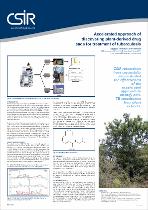 ResearchSpace
ResearchSpace
Accelerated approach of discovering plant-derived drug leads for treatment of tuberculosis
JavaScript is disabled for your browser. Some features of this site may not work without it.
- ResearchSpace
- →
- Research Publications/Outputs
- →
- Conference Publications
- →
- View Item
| dc.contributor.author |
Naidoo, Dashnie

|
|
| dc.contributor.author |
Maharaj, V

|
|
| dc.contributor.author |
Steenkamp, P

|
|
| dc.date.accessioned | 2010-09-02T09:59:39Z | |
| dc.date.available | 2010-09-02T09:59:39Z | |
| dc.date.issued | 2010-09-01 | |
| dc.identifier.citation | Naidoo, D, Maharaj, V and Steenkamp, P. 2010. Accelerated approach of discovering plant-derived drug leads for treatment of tuberculosis. CSIR 3rd Biennial Conference 2010. Science Real and Relevant. CSIR International Convention Centre, Pretoria, South Africa, 30 August – 01 September 2010, pp 1 | en |
| dc.identifier.uri | http://hdl.handle.net/10204/4300 | |
| dc.description | CSIR 3rd Biennial Conference 2010. Science Real and Relevant. CSIR International Convention Centre, Pretoria, South Africa, 30 August – 01 September 2010 | en |
| dc.description.abstract | The bioprospecting research group at CSIR biosciences undertakes research that taps into South Africa’s plant biodiversity with the aim of discovering natural products that can be used to develop new medicines effective against tuberculosis (TB). To achieve this, the group has implemented the accelerated 96 well plate fractionation approach (Figure 1) to speed up the identification of active ingredients and interesting chemical scaffolds for subsequent medicinal chemistry developments, and to prevent the repeated discovery of known and undesired compounds, thereby saving time and resources. To demonstrate the effectiveness of the accelerated approach, one of the organic plant extracts that displayed good anti-TB activity (MIC ≤ 250 μg/ml) was fractionated and screened for biological activity. The active fractions were analysed by UPLC-TO F-DADMS for UV, accurate mass and MS-MS fragmentation data to identify the compounds present. By using the data to search the Dictionary of natural products, scientists could identify the compound responsible for activity and could make upfront go/ no go decisions, depending on the compound’s desirability as a drug lead | en |
| dc.language.iso | en | en |
| dc.publisher | CSIR | en |
| dc.subject | Plant-derived drug leads | en |
| dc.subject | Tuberculosis | en |
| dc.subject | Tuberculosis treatment | en |
| dc.subject | Bioprospecting | en |
| dc.subject | CSIR Conference 2010 | en |
| dc.title | Accelerated approach of discovering plant-derived drug leads for treatment of tuberculosis | en |
| dc.type | Conference Presentation | en |
| dc.identifier.apacitation | Naidoo, D., Maharaj, V., & Steenkamp, P. (2010). Accelerated approach of discovering plant-derived drug leads for treatment of tuberculosis. CSIR. http://hdl.handle.net/10204/4300 | en_ZA |
| dc.identifier.chicagocitation | Naidoo, Dashnie, V Maharaj, and P Steenkamp. "Accelerated approach of discovering plant-derived drug leads for treatment of tuberculosis." (2010): http://hdl.handle.net/10204/4300 | en_ZA |
| dc.identifier.vancouvercitation | Naidoo D, Maharaj V, Steenkamp P, Accelerated approach of discovering plant-derived drug leads for treatment of tuberculosis; CSIR; 2010. http://hdl.handle.net/10204/4300 . | en_ZA |
| dc.identifier.ris | TY - Conference Presentation AU - Naidoo, Dashnie AU - Maharaj, V AU - Steenkamp, P AB - The bioprospecting research group at CSIR biosciences undertakes research that taps into South Africa’s plant biodiversity with the aim of discovering natural products that can be used to develop new medicines effective against tuberculosis (TB). To achieve this, the group has implemented the accelerated 96 well plate fractionation approach (Figure 1) to speed up the identification of active ingredients and interesting chemical scaffolds for subsequent medicinal chemistry developments, and to prevent the repeated discovery of known and undesired compounds, thereby saving time and resources. To demonstrate the effectiveness of the accelerated approach, one of the organic plant extracts that displayed good anti-TB activity (MIC ≤ 250 μg/ml) was fractionated and screened for biological activity. The active fractions were analysed by UPLC-TO F-DADMS for UV, accurate mass and MS-MS fragmentation data to identify the compounds present. By using the data to search the Dictionary of natural products, scientists could identify the compound responsible for activity and could make upfront go/ no go decisions, depending on the compound’s desirability as a drug lead DA - 2010-09-01 DB - ResearchSpace DP - CSIR KW - Plant-derived drug leads KW - Tuberculosis KW - Tuberculosis treatment KW - Bioprospecting KW - CSIR Conference 2010 LK - https://researchspace.csir.co.za PY - 2010 T1 - Accelerated approach of discovering plant-derived drug leads for treatment of tuberculosis TI - Accelerated approach of discovering plant-derived drug leads for treatment of tuberculosis UR - http://hdl.handle.net/10204/4300 ER - | en_ZA |





